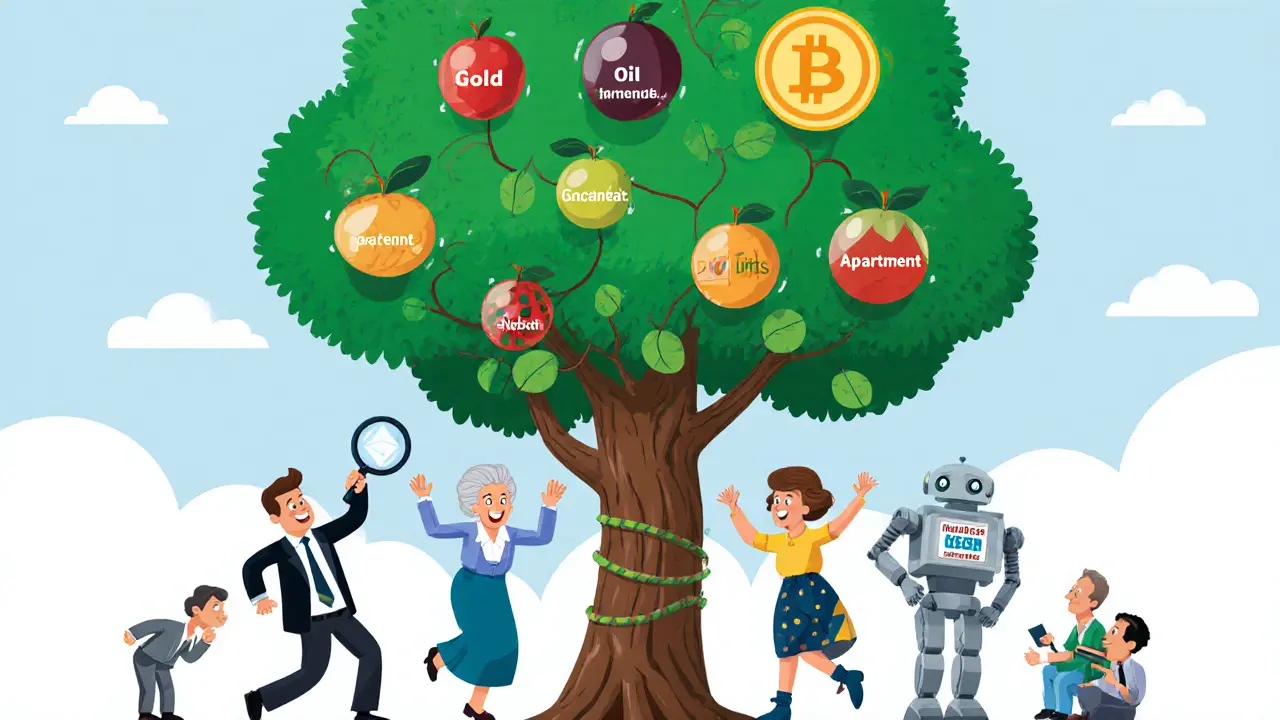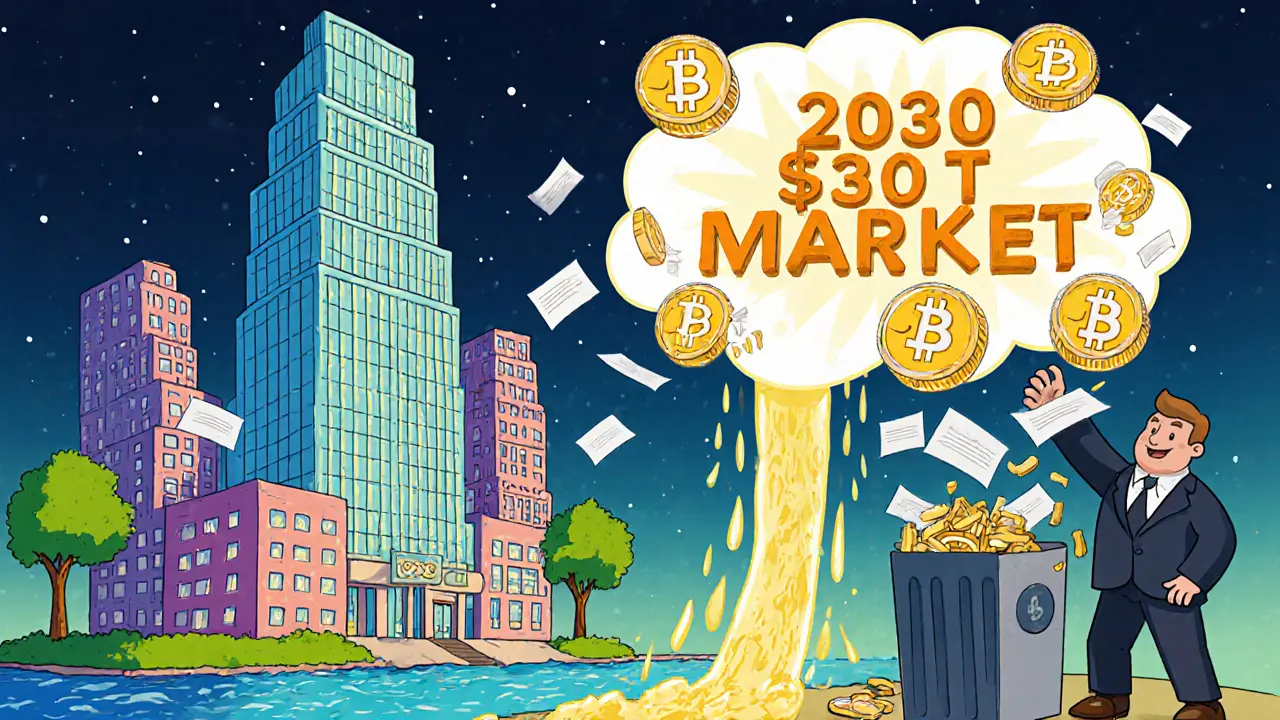Accredited Investor Status Checker
The U.S. Securities and Exchange Commission (SEC) defines accredited investors as individuals who meet specific financial criteria. Most security tokens are currently only available to accredited investors, with two key requirements:
- Annual income over $200,000 (or $300,000 jointly with a spouse) for the last two years, with expectation of same or higher income this year
- Net worth exceeding $1 million (excluding primary residence) OR other qualifying assets
The security token market isn’t just another crypto trend-it’s the quiet revolution turning stocks, bonds, real estate, and even commodities into digital assets you can buy, sell, and trade on blockchain networks. Unlike the wild west of early ICOs, this space is being built by Wall Street giants, regulated by the SEC, and backed by real-world value. By 2030, this market could be worth anywhere from $2 trillion to $30 trillion. That’s not speculation. It’s what’s already unfolding.
What Exactly Is a Security Token?
A security token is a digital representation of a real asset-like a share in a company, a slice of a commercial building, or a bond issued by a government. It’s not a cryptocurrency like Bitcoin. It doesn’t exist to be speculative. It’s a legal claim, recorded on a blockchain, with ownership rights enforced by smart contracts. Think of it as a stock certificate, but instead of paper, it’s code. And instead of waiting weeks to settle a trade, it happens in minutes. In 2024, over $50 billion in traditional assets-stocks, bonds, and real estate-were already tokenized. Add in $200 billion in stablecoins (tokenized U.S. dollars), and you’ve got a quarter-trillion-dollar ecosystem operating under clear regulatory rules. This isn’t fringe tech. It’s finance, upgraded.Why Now? The Perfect Storm
Three things are pushing this market forward at breakneck speed. First, regulatory clarity. The U.S. Securities and Exchange Commission finally drew a line: if a token represents ownership in an asset, it’s a security. That means it must follow existing securities laws-registration, disclosure, investor protections. No more shady ICOs. This isn’t a wall; it’s a runway. Institutions like BlackRock and Franklin Templeton are now launching tokenized funds because they know exactly what’s allowed. Second, institutional adoption. In 2024, nearly 70% of capital in security tokens came from professional investors-hedge funds, asset managers, family offices. Retail investors are watching, but the real money is coming from those who can afford compliance teams and legal counsel. BlackRock’s on-chain liquidity funds? They’re not experiments. They’re the new infrastructure. Third, blockchain interoperability. Early tokenization ran on private, permissioned blockchains-controlled, slow, expensive. Now, the market is shifting to public, permissionless networks like Ethereum and Polygon. Why? Because they offer global liquidity, lower fees, and seamless integration with DeFi protocols. A tokenized bond can now be used as collateral in a lending protocol. A share in a California apartment can be traded on a global exchange without intermediaries. That’s the power of open systems.Real Estate Leads-But Commodities Are Catching Up
Right now, real estate dominates the security token market, making up over 30% of all tokenized assets. Why? Because property is illiquid, expensive, and hard to divide. Tokenization fixes that. You can now buy a $500 slice of a Manhattan office tower. Or a fraction of a warehouse in Ohio. No need for a full purchase. No need for a broker. Just a wallet and a smart contract. But the fastest-growing segment? Commodities. Tokens representing gold, oil, or agricultural products are growing at a 50% annual rate. Why? Because global supply chains are fragile, and investors want direct exposure without physical storage or futures contracts. Tokenized gold, for example, can be traded 24/7, verified on-chain, and redeemed for physical metal if needed. It’s the old system, but faster, cheaper, and more transparent.
Who’s Winning Geographically?
North America leads with 36% of the market share, thanks to clear U.S. regulations and the presence of major financial institutions. But the real growth story is in Asia-Pacific. Countries like India are rolling out tokenization for payment systems-RuPay cards now use tokenization to secure transactions. That’s not just finance. That’s infrastructure. The Middle East and Africa are projected to grow the fastest-27.5% CAGR-driven by sovereign wealth funds looking to diversify into digital assets. Singapore and Dubai are building regulatory sandboxes to attract tokenization startups. This isn’t a U.S.-only movement. It’s global.The Tech Behind the Tokens
Tokenization isn’t magic. It’s a stack. At the bottom: a blockchain. Most new projects use Ethereum or compatible chains because of their developer tools and security track record. Above that: identity verification. You can’t buy a security token without KYC/AML checks. That’s non-negotiable. Solutions like Civic and Onfido integrate directly into token platforms. Then: smart contracts. These define the rules-how dividends are paid, how ownership transfers, when voting rights activate. A tokenized bond might auto-pay interest every quarter. A real estate token might let holders vote on renovations. And on top: trading platforms. These aren’t crypto exchanges like Binance. They’re regulated broker-dealers like Securitize or tZero, where tokens are issued, traded, and settled under SEC oversight. The result? A system that’s more efficient than traditional finance. No paper. No middlemen. No settlement delays. Just code enforcing rules.Why Retail Investors Are Still on the Sidelines
You might be wondering: if this is so great, why aren’t everyday people jumping in? Because regulation still blocks them. Most security tokens are only available to accredited investors-people with $200k+ income or $1M+ net worth. That’s by design. The SEC wants to protect small investors from complex, illiquid assets. But that’s changing. Some platforms are testing fractional ownership for non-accredited investors under Regulation A+ and Regulation CF. A $10,000 apartment project might now let 100 people each buy $100 worth of tokens. It’s slow, but it’s happening. Retail adoption will come-not with a bang, but with a trickle. As more tokenized assets get listed on regulated platforms, and as user interfaces improve, average people will start seeing these as just another investment option-like ETFs or mutual funds.
Challenges That Still Exist
This isn’t a utopia. There are real hurdles. First: fragmentation. Different countries have different rules. A token issued in the U.S. might not be legal in the EU. Cross-border trading is still clunky. Second: liquidity. Even if you own a token, finding a buyer isn’t guaranteed. Many platforms have thin trading volumes. That’s improving, but it’s still a risk. Third: tech complexity. Most people don’t understand wallets, private keys, or gas fees. If you lose your key, you lose your asset. No customer service can help you. That’s a big barrier. And fourth: perception. Many still confuse security tokens with crypto scams. Education is the missing piece.What This Means for the Future
By 2030, security tokens won’t be a niche. They’ll be the default way to invest in real assets. Think about it: your 401(k) might hold tokenized bonds. Your rental property could be partially owned by investors in Japan. Your pension fund might own a slice of a wind farm in Texas, tracked on-chain with transparent returns. The $30 trillion forecast? It’s not fantasy. It’s what happens when finance stops being analog. When every asset can be divided, traded, and verified instantly. When the rules are written in code, not in legalese. The old system isn’t disappearing. It’s being layered with blockchain. And the winners? The institutions that move fast, the developers who build simple tools, and the regulators who stay clear-headed. This isn’t about replacing Wall Street. It’s about making it better.What Comes Next?
The next 18 months will be critical. Expect:- More U.S. ETFs approved for tokenized assets
- Central banks experimenting with tokenized government bonds
- Major banks launching internal tokenization platforms
- Regulators in Europe and Asia aligning rules with the U.S.
Are security tokens the same as cryptocurrencies like Bitcoin?
No. Bitcoin is a decentralized digital currency with no underlying asset. Security tokens represent real-world assets like stocks, bonds, or real estate and are regulated as securities. They’re not meant for speculation-they’re meant to represent ownership.
Can I buy security tokens as a regular investor?
Currently, most are only available to accredited investors-those with high income or net worth. But platforms are starting to offer fractional ownership to non-accredited investors under new SEC rules like Regulation A+ and Regulation CF. It’s still limited, but it’s growing.
Why is real estate the biggest segment in security token markets?
Real estate is traditionally illiquid and expensive to buy in full. Tokenization lets people own fractions of properties without needing millions. It opens up access to high-value assets for smaller investors and makes trading faster and cheaper than traditional methods.
What’s the difference between STOs and ICOs?
ICOs were unregulated coin sales with no backing-often scams. STOs (Security Token Offerings) are regulated under securities laws. They require disclosures, investor protections, and compliance. STOs are legal financial instruments. ICOs are mostly gone.
Do I need a crypto wallet to hold security tokens?
Yes. Security tokens are stored in digital wallets, usually compatible with Ethereum or other blockchain standards. But unlike regular crypto, you typically access them through regulated platforms that handle KYC and custody for you-so you don’t need to manage private keys yourself unless you choose to.
Is the security token market just hype?
No. Major institutions like BlackRock and Franklin Templeton are investing billions. Regulators are creating frameworks. Real assets are being tokenized daily. This isn’t speculation-it’s the next evolution of finance, backed by real capital and real legal structure.

Comments (14)
Kaitlyn Boone
November 22, 2025 AT 01:23
tokenization is just wall street repackaging the same old crap with a blockchain label. they still control everything. you think you own a slice of a building? nah. they can freeze your tokens anytime they want. this isn't freedom. it's surveillance with better ui.
James Edwin
November 22, 2025 AT 07:46
this is the future and you’re sleeping on it. imagine buying a piece of a solar farm in nevada with your phone. no brokers. no paperwork. just code. the institutions are moving. are you?
Kris Young
November 23, 2025 AT 17:03
Security tokens are digital representations of real-world assets. They are regulated. They are not speculative. They are not cryptocurrencies. They are legal instruments. They require compliance. They are not hype.
LaTanya Orr
November 23, 2025 AT 20:00
what does it mean to own something anymore? if your share of a building exists only as code in a ledger, who really holds the power? the blockchain doesn't care about your rent check. it just follows the rules. maybe the real revolution isn't the tech. maybe it's that we've stopped asking what ownership even means anymore.
Ashley Finlert
November 24, 2025 AT 05:24
This is not merely a technological shift-it is a civilizational recalibration of capital itself. The parchment and ink of centuries are being rendered obsolete by cryptographic permanence. The quiet dignity of the stock certificate, once a symbol of bourgeois aspiration, now yields to the luminous elegance of on-chain provenance. We stand at the precipice of a financial renaissance, where liquidity is no longer a privilege but a protocol. The world is not merely digitizing finance-it is redefining trust.
Marilyn Manriquez
November 24, 2025 AT 11:36
if you're not investing in tokenized assets you're leaving money on the table. the future is here. it's just not evenly distributed yet. get ready. get informed. get in. this isn't optional. it's inevitable.
taliyah trice
November 25, 2025 AT 06:46
i dont get all the tech stuff but i heard you can buy part of a house now? that sounds cool.
Peter Mendola
November 25, 2025 AT 09:19
LOL. retail investors will never understand this. they still think crypto is a meme. the real money is in institutions. you’re not invited.
Terry Watson
November 26, 2025 AT 00:52
wait-so you’re telling me I can finally invest in that warehouse in Cleveland without needing a million bucks? and it’s settled in minutes? and I can use it as collateral in DeFi? and it’s regulated? oh my god. this is the most beautiful thing I’ve ever heard. someone pinch me. this isn’t a dream. this is real. i’m crying. seriously.
Norm Waldon
November 27, 2025 AT 01:59
you think this is about finance? no. this is about the global elite creating a digital surveillance state where your assets are tracked, taxed, and controlled by unelected bureaucrats in Washington and Geneva. they want you to believe it’s progress. it’s not. it’s enslavement with a blockchain logo.
neil stevenson
November 28, 2025 AT 03:20
bro just got a token for 1% of a coffee farm in colombia. it pays dividends every month. i’m not joking. it’s wild. just use a platform like realt. no crazy keys. super easy. i’m hooked.
Samantha bambi
November 28, 2025 AT 18:39
i love how this is finally making real estate accessible. my aunt in ohio just bought $200 worth of a rental property in texas. she’s never owned anything before. now she gets quarterly updates and a little bit of rent. it’s not much-but it’s hers. and that matters.
Melina Lane
November 29, 2025 AT 13:34
just started reading up on this last week. i’m not rich but i’m saving up to try a small fractional investment. feels like the first time i saw online banking. simple, safe, and actually useful.
andrew casey
December 1, 2025 AT 05:44
One must acknowledge the profound structural implications of this paradigm shift. The ontological basis of asset ownership has been reconfigured through cryptographic consensus mechanisms, thereby rendering traditional custodial models obsolete. The institutional adoption trajectory is not merely indicative of market demand-it is an epistemological rupture in the architecture of capital. One cannot, therefore, dismiss this phenomenon as mere technological novelty. It is the inevitable evolution of fiduciary responsibility in the digital age.